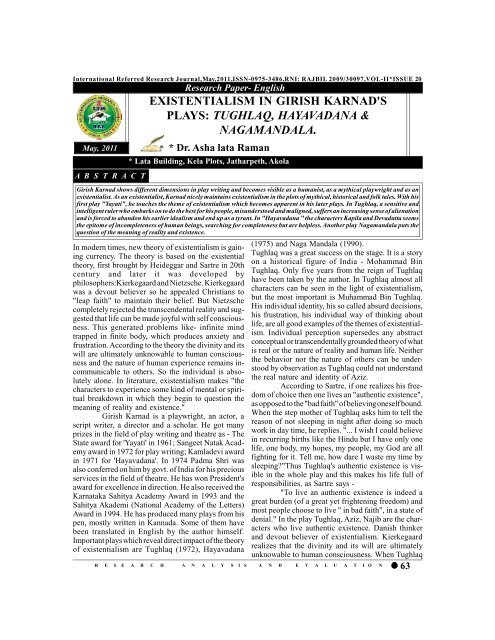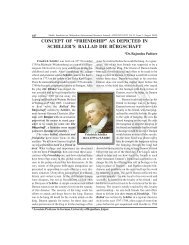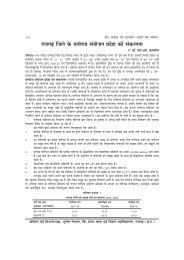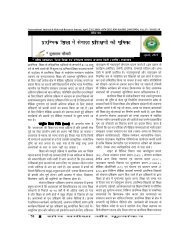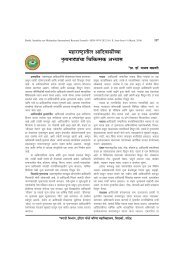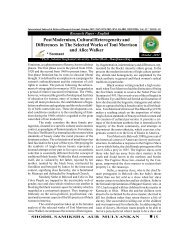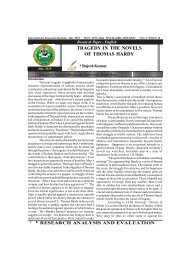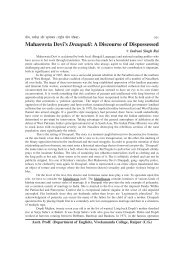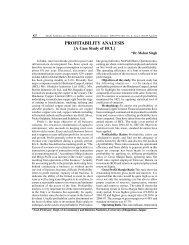existentialism in girish karnad's plays: tughlaq, hayavadana ...
existentialism in girish karnad's plays: tughlaq, hayavadana ...
existentialism in girish karnad's plays: tughlaq, hayavadana ...
You also want an ePaper? Increase the reach of your titles
YUMPU automatically turns print PDFs into web optimized ePapers that Google loves.
International Referred Research Journal,May,2011,ISSN-0975-3486,RNI: RAJBIL 2009/30097,VOL-II*ISSUE 20<br />
May, 2011<br />
A B S T R A C T<br />
Research Paper- English<br />
EXISTENTIALISM IN GIRISH KARNAD'S<br />
PLAYS: TUGHLAQ, HAYAVADANA &<br />
NAGAMANDALA.<br />
* Dr. Asha lata Raman<br />
* Lata Build<strong>in</strong>g, Kela Plots, Jatharpeth, Akola<br />
Girish Karnad shows different dimensions <strong>in</strong> play writ<strong>in</strong>g and becomes visible as a humanist, as a mythical playwright and as an<br />
existentialist. As an existentialist, Karnad nicely ma<strong>in</strong>ta<strong>in</strong>s <strong>existentialism</strong> <strong>in</strong> the plots of mythical, historical and folk tales. With his<br />
first play "Yayati", he touches the theme of <strong>existentialism</strong> which becomes apparent <strong>in</strong> his later <strong>plays</strong>. In Tughlaq, a sensitive and<br />
<strong>in</strong>telligent ruler who embarks on to do the best for his people, misunderstood and maligned, suffers an <strong>in</strong>creas<strong>in</strong>g sense of alienation<br />
and is forced to abandon his earlier idealism and end up as a tyrant. In "Hayavadana " the characters Kapila and Devadutta seems<br />
the epitome of <strong>in</strong>completeness of human be<strong>in</strong>gs, search<strong>in</strong>g for completeness but are helpless. Another play Nagamandala puts the<br />
question of the mean<strong>in</strong>g of reality and existence.<br />
In modern times, new theory of <strong>existentialism</strong> is ga<strong>in</strong><strong>in</strong>g<br />
currency. The theory is based on the existential<br />
theory, first brought by Heideggar and Sartre <strong>in</strong> 20th<br />
century and later it was developed by<br />
philosophers:Kierkegaard and Nietzsche. Kierkegaard<br />
was a devout believer so he appealed Christians to<br />
"leap faith" to ma<strong>in</strong>ta<strong>in</strong> their belief. But Nietzsche<br />
completely rejected the transcendental reality and suggested<br />
that life can be made joyful with self consciousness.<br />
This generated problems like- <strong>in</strong>f<strong>in</strong>ite m<strong>in</strong>d<br />
trapped <strong>in</strong> f<strong>in</strong>ite body, which produces anxiety and<br />
frustration. Accord<strong>in</strong>g to the theory the div<strong>in</strong>ity and its<br />
will are ultimately unknowable to human consciousness<br />
and the nature of human experience rema<strong>in</strong>s <strong>in</strong>communicable<br />
to others. So the <strong>in</strong>dividual is absolutely<br />
alone. In literature, <strong>existentialism</strong> makes "the<br />
characters to experience some k<strong>in</strong>d of mental or spiritual<br />
breakdown <strong>in</strong> which they beg<strong>in</strong> to question the<br />
mean<strong>in</strong>g of reality and existence."<br />
Girish Karnad is a playwright, an actor, a<br />
script writer, a director and a scholar. He got many<br />
prizes <strong>in</strong> the field of play writ<strong>in</strong>g and theatre as - The<br />
State award for 'Yayati' <strong>in</strong> 1961; Sangeet Natak Academy<br />
award <strong>in</strong> 1972 for play writ<strong>in</strong>g; Kamladevi award<br />
<strong>in</strong> 1971 for 'Hayavadana'. In 1974 Padma Shri was<br />
also conferred on him by govt. of India for his precious<br />
services <strong>in</strong> the field of theatre. He has won President's<br />
award for excellence <strong>in</strong> direction. He also received the<br />
Karnataka Sahitya Academy Award <strong>in</strong> 1993 and the<br />
Sahitya Akademi (National Academy of the Letters)<br />
Award <strong>in</strong> 1994. He has produced many <strong>plays</strong> from his<br />
pen, mostly written <strong>in</strong> Kannada. Some of them have<br />
been translated <strong>in</strong> English by the author himself.<br />
Important <strong>plays</strong> which reveal direct impact of the theory<br />
of <strong>existentialism</strong> are Tughlaq (1972), Hayavadana<br />
(1975) and Naga Mandala (1990).<br />
Tughlaq was a great success on the stage. It is a story<br />
on a historical figure of India - Mohammad B<strong>in</strong><br />
Tughlaq. Only five years from the reign of Tughlaq<br />
have been taken by the author. In Tughlaq almost all<br />
characters can be seen <strong>in</strong> the light of <strong>existentialism</strong>,<br />
but the most important is Muhammad B<strong>in</strong> Tughlaq.<br />
His <strong>in</strong>dividual identity, his so called absurd decisions,<br />
his frustration, his <strong>in</strong>dividual way of th<strong>in</strong>k<strong>in</strong>g about<br />
life, are all good examples of the themes of <strong>existentialism</strong>.<br />
Individual perception supersedes any abstract<br />
conceptual or transcendentally grounded theory of what<br />
is real or the nature of reality and human life. Neither<br />
the behavior nor the nature of others can be understood<br />
by observation as Tughlaq could not understand<br />
the real nature and identity of Aziz.<br />
Accord<strong>in</strong>g to Sartre, if one realizes his freedom<br />
of choice then one lives an "authentic existence",<br />
as opposed to the "bad faith" of believ<strong>in</strong>g oneself bound.<br />
When the step mother of Tughlaq asks him to tell the<br />
reason of not sleep<strong>in</strong>g <strong>in</strong> night after do<strong>in</strong>g so much<br />
work <strong>in</strong> day time, he replies. "... I wish I could believe<br />
<strong>in</strong> recurr<strong>in</strong>g births like the H<strong>in</strong>du but I have only one<br />
life, one body, my hopes, my people, my God are all<br />
fight<strong>in</strong>g for it. Tell me, how dare I waste my time by<br />
sleep<strong>in</strong>g?"Thus Tughlaq's authentic existence is visible<br />
<strong>in</strong> the whole play and this makes his life full of<br />
responsibilities, as Sartre says -<br />
"To live an authentic existence is <strong>in</strong>deed a<br />
great burden (of a great yet frighten<strong>in</strong>g freedom) and<br />
most people choose to live " <strong>in</strong> bad faith", <strong>in</strong> a state of<br />
denial." In the play Tughlaq, Aziz, Najib are the characters<br />
who live authentic existence. Danish th<strong>in</strong>ker<br />
and devout believer of <strong>existentialism</strong>. Kierkegaard<br />
realizes that the div<strong>in</strong>ity and its will are ultimately<br />
unknowable to human consciousness. When Tughlaq<br />
R E S E A R C H A N A L Y S I S A N D E V A L U A T I O N<br />
63
International Referred Research Journal,May,2011,ISSN-0975-3486, RNI: RAJBIL 2009/30097, VOL-II *ISSUE 20<br />
f<strong>in</strong>ds that his policies are be<strong>in</strong>g questioned, he rather Ramanujan <strong>in</strong> Chicago. These stories convey female<br />
feels that his identity as a ruler is at a stake. So, he understand<strong>in</strong>g of the reality around her, a patriarchal<br />
wants to become a complete man. He is restless and pattern of typical Indian family <strong>in</strong>stitutions. The stories<br />
suffer<strong>in</strong>g from the problems of isolation and frustration.<br />
symbolically express the mean<strong>in</strong>g of reality and<br />
Examples are galore <strong>in</strong> the play to show that on woman's, existence <strong>in</strong> it. In the first story, man is not<br />
several occasions, the decisions taken by Tughlaq aware of the transcendental reality and is not serious<br />
become wrong such as the decision of shift<strong>in</strong>g the for the mendicant's premonition about his death. But<br />
capital from Delhi to Daulatabad. In another occasion as the last night of his life comes,he because of fear of<br />
he defends his decision of giv<strong>in</strong>g same value to copper death goes <strong>in</strong> a temple which is nameless and empty<br />
co<strong>in</strong> as well as silver co<strong>in</strong>.<br />
which symbolizes human be<strong>in</strong>g's disbelief <strong>in</strong> the existence<br />
"It's a question of confidence. A question of trust.The<br />
of God. He ma<strong>in</strong>ta<strong>in</strong>s his belief on God only <strong>in</strong><br />
other day I heard that <strong>in</strong> Ch<strong>in</strong>a they have paper currency-paper,m<strong>in</strong>d<br />
fear of disasters. The man sayspeople<br />
you and yet it works because the "... I swear by this absent God ..."<br />
accept it.They have faith <strong>in</strong> the Emporor's seal Karnad argues that the oral tales are paradoxical<br />
on the pieces of paper."<br />
<strong>in</strong> nature. Their status is like that of a daughter<br />
A similar feel<strong>in</strong>g is expressed <strong>in</strong> 'Hayavadana'. who has her own .Similarly as a daughter has to leave<br />
"... I have tried everyth<strong>in</strong>g. But where is my her home, a tale has to leave its home of orig<strong>in</strong> for<br />
society? Where? You must help me to become a complete<br />
be<strong>in</strong>g passed on to people. A tale symbolizes a daugh-<br />
man, Bhagavata Sir. But how? What can I do?" ter, like a tale daughter has his own existence <strong>in</strong>depen-<br />
Here <strong>in</strong> the novel ,the story of Devadatta, Kapila and dent of the parent and as a tale live only when it is<br />
Padm<strong>in</strong>i deals with the problems of all the three <strong>in</strong>dividually.<br />
passed on from the possessor to listener similarly a<br />
Padm<strong>in</strong>i is attracted to Kapila's body and daughter has to go somewhere else. It is the reality of<br />
loves Devadatta's <strong>in</strong>telligence. When all the three go a female existence.<br />
to visit a fair <strong>in</strong> Ujja<strong>in</strong>, on the way they go one by one The ma<strong>in</strong> story of Naga Mandala is the story<br />
<strong>in</strong> the Kali temple. At first, Devadatta and then Kapila of Rani which deals with the absurdities of universe;<br />
offer their heads to Goddess Kali. At last .Padm<strong>in</strong>i the <strong>in</strong>dividual perception of reality and authentic existence.<br />
after see<strong>in</strong>g the dead bodies of Devadatta and Kapila<br />
Marriage <strong>in</strong> a jo<strong>in</strong>t family can be problematic<br />
tries to offer her head to Kali. The Goddess wakes up for a woman when the husband and wife live as strangers<br />
and says <strong>in</strong> irritation that human be<strong>in</strong>gs should come<br />
<strong>in</strong> day time. If the symbolic expression is given then<br />
to Her to hack of their heads <strong>in</strong> Her name, <strong>in</strong> reality the "the empty house Rani is locked <strong>in</strong> could be the family<br />
reason is someth<strong>in</strong>g else. By the boon of Goddess she is married <strong>in</strong>to" and "the position of Rani <strong>in</strong> the<br />
Padm<strong>in</strong>i fixes heads with bodies but she commits a story can be seen as a metaphor for the situation of a<br />
mistake of fix<strong>in</strong>g different heads on different bodies young girl <strong>in</strong> the bosom of a jo<strong>in</strong>t family where she see<br />
which causes the suffer<strong>in</strong>gs and a problem of identity her husband only <strong>in</strong> two unconnected roles - as a<br />
for Devadatta and Kapila . Now both claim to be stranger <strong>in</strong> dur<strong>in</strong>g the day and as lover at night." Therefore<br />
Devadutta as one has his body and other head. They<br />
authentic existence of a married young woman <strong>in</strong><br />
seek to solve the problem by dye<strong>in</strong>g. "What won't end Indian jo<strong>in</strong>t family is almost impossible. She tries to<br />
has to be cut." Kapila says -<br />
observe the reality and struggles for authentic<br />
"... Now whose head - whose body - suicide or murder<br />
existence.Thus Girish Karnad has a keen understand-<br />
-noth<strong>in</strong>g's clear."<br />
<strong>in</strong>g of the problems of human be<strong>in</strong>g and his place on<br />
At the end both die but the problem rema<strong>in</strong>s the earth. He casts human desires, which show the way<br />
unsolved for Padm<strong>in</strong>i."Kali, Mother of all nature, you to <strong>in</strong>human harassments through his <strong>plays</strong>. Tughlaq,<br />
must have your joke even now. Other women can die Hayavadana, Padm<strong>in</strong>i, Kapila, and Rani are the characters<br />
pray<strong>in</strong>g that they should get the same husband <strong>in</strong> all<br />
<strong>in</strong> the midst of situations giv<strong>in</strong>g a picture of the<br />
the lives to come. You haven't left me even that little way from attractive imag<strong>in</strong>ation to ugly reality. Both<br />
consolation."'Naga Mandala' is based on two Kannada the <strong>in</strong>ner and outer world of man is tormented with<br />
folk tales that Karnad had heard from Professor A. K. psychological and communal limitations.<br />
R E F E R E N C E<br />
1. Abrams M.H., A Glossary of Literary Terms. 6th ed. Bangalore,Prism Books, 1993. 2.Bhatta S. Krishna, Indian English Drama: A Critical<br />
Study. New Delhi, Sage Publishers. 1987) 3. Karnad Girish, Three Plays: Naga-Mandala, Hayavadana, Tughlaq.Delhi: Oxford University<br />
Press, 1995) 4. Pandey Mithlesh K., Contemporary Indian Literature <strong>in</strong> English: A Humanistic Perspective.Noida: Kalyani ," 1999)<br />
64<br />
R E S E A R C H A N A L Y S I S A N D E V A L U A T I O N


